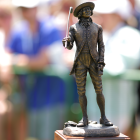Golf is not a team sport. Rather, post-college PGA Tour and European Tour golf is not a team sport. Players exist as independent entities, save the one time a year when they play in the Presidents Cup or Ryder Cup. But while nobody is keeping score of how many majors have gone to Spain or England or the United States, you can bet players have taken notice that Americans have won five of these in a row dating back to Brooks Koepka's 2017 U.S. Open win at Erin Hills.
That was followed by Jordan Spieth taking this very Open Championship from a different American (Matt Kuchar) in July, Justin Thomas winning the PGA Championship at Quail Hollow, Patrick Reed storming the gates of Augusta National this spring and finally Koepka bookending the run with a follow-up victory at Shinnecock Hills last month.
"The American boys are playing really, really good golf," Englishman Justin Rose said last week. "I think the European Ryder Cup Team, if you want to compare the two, is looking incredibly strong. I think we have a great chance in September, but we are not winning the right events. We are not winning the big events, and that is key.
"I mean, listen, we're not a team; we're a team one week every two years. Obviously Rory [McIlroy], myself, Sergio [Garcia] --there's a bunch of players -- Tommy [Fleetwood] have been knocking on the door of major championships in the last few years, but it's definitely been pretty one-sided and the Americans are dominating. So it would be lovely to turn that around next week."
Rose will be among the favorites to do so, but an Englishman hasn't won The Open Championship since 1992. And while we're talking about streaks, how about the last time the U.S. took home six majors in a row?
That would be 1981-82 when Bill Rogers win the 1981 Open, Larry Nelson took the 1981 PGA Championship, Craig Stadler won the 1982 Masters, Tom Watson won both Opens in 1982, and Raymond Floyd touched it off with the 1982 PGA Championship. To find a streak longer than that for the U.S., you have to go to 1974-77 when they won 13 (!) in a row.
That number won't be touched this time around, but it's feasible that this current streak could fall somewhere between those two. Six of the top nine favorites at Carnoustie this year are Americans, including overall favorite Dustin Johnson. Rickie Fowler is coming in with great form. Spieth will go for a repeat. Tiger Woods will crush on these slick fairways. Nobody has been more consistent at majors over the past three years than Koepka. It's very easy to see one of them taking home the trophy.
The interesting part of all of this to me is that America isn't necessarily dominating the Official World Golf Rankings. Of the top 20 players in the world, only eight are from the U.S. A minority, and yet they took first and second at Erin Hills and Royal Birkdale, swept the medal stand at this year's Masters and swiped four of the top five slots at Shinnecock.
It's been ... dominant.
Whether that can continue remains to be seen, but there will surely be Ryder Cup undercurrents running throughout the two remaining major championships. You won't get points at Le Golf National outside Paris for coming into the Ryder Cup having won seven straight majors (which is currently on the table for the U.S.), but you do get a little extra swagger. You also might get Patrick Reed using the green jacket to repel off the Eiffel Tower in a craze, but that's a different story.
If the U.S. continues to insert itself into the winner's circle over the final two majors before the 2018 Ryder Cup like it has been doing for the last year and a half, the biggest team event in the world will suddenly take on a different dynamic. It won't be huge, and it might be subtle, but something will be different. That won't make much difference to each individual trying to win the Claret Jug this weekend, but you can bet it will mean everything come time for Paris in late September.





















